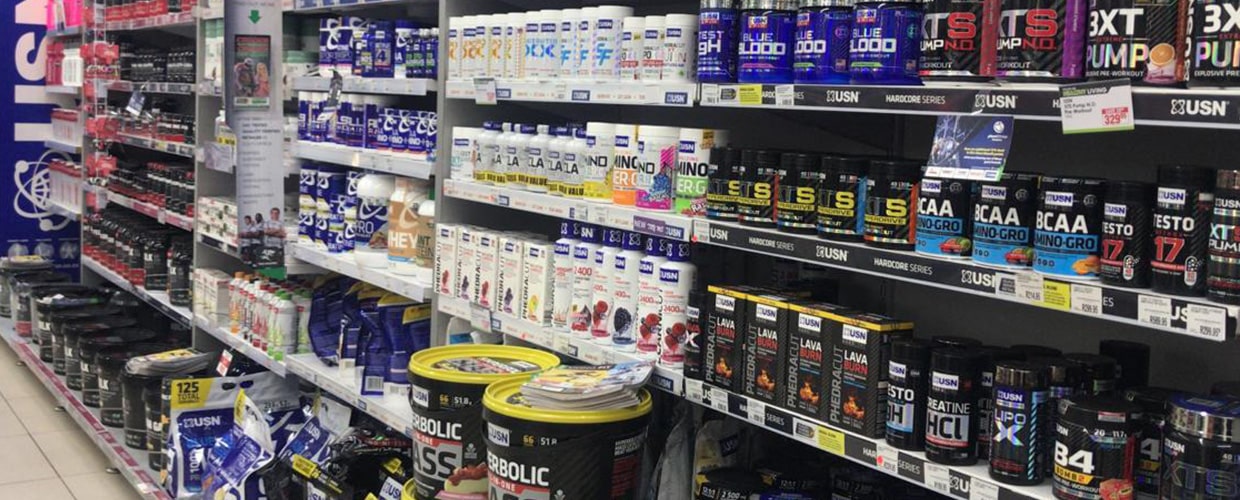A good protein supplement is a non-negotiable in everyone’s nutrition plan, whether your aim is to build a better body or improve your performance.
At Dis-Chem, you’re spoilt for choice with the sheer number of brands and products available.
For the uninformed, even choosing the best form of protein for you and your specific needs requires some deliberation as whey protein is no longer the only option. If that’s the case, use these insights into the various benefits of each available protein to help you make a more informed decision.
Whey protein
Whey protein is a by-product of the cheese-making process and is one of two protein sources derived from dairy. It is, by far, the most popular supplemental protein source available and for good reason.
Firstly, it is a complete protein which means it contains all nine essential amino acids – the ones your body can’t make on its own – with the high levels of leucine, a powerful amino acid that can be used for energy production in muscle cells and is an important driver of muscle repair and growth.
Whey also contains numerous beneficial compounds that include growth factors and branched-chain amino acids (BCAA), and, importantly, is also highly bioavailable, which means it is digested and absorbed rapidly.
Whey protein supplements typically come in three forms: a concentrate, isolate or hydrolysate, or a combination. This delivers the ultimate blend for rapid absorption, which accelerates the muscle repair and recovery process.
Whey concentrates:
- Contains a low level of fat and cholesterol.
- Has higher levels of bioactive compounds.
- Contains carbohydrates in the form of lactose.
- Are 29–89% protein by weight (depending on manufacturer).
Whey isolates:
- Processed to remove fat and lactose.
- Usually lower in bioactive compounds and protein sub-fractions, which are removed in the filtering process.
- Can be up to 90%+ protein by weight (depending on the manufacturer).
Whey hydrolysates:
- Predigested, partially hydrolysed whey proteins.
- Generally more bioavailable than other forms.
- Highly-hydrolysed whey may be less allergenic than other forms of whey.
Casein protein
Casein is the other milk-derived protein. It is absorbed more slowly than whey as it tends to clump in the digestive tract, which makes it a popular product for use at night when an extended-release of amino acids is needed to maintain anabolic processes during sleep for as long as possible.
Its slower rate of digestion also means it can leave you feeling full for longer, which makes it a common addition to meal-replacement or diet shakes. A popular form of this supplement is micellar casein, which has the slowest rate of digestion and assimilation of supplemental protein sources. Another common form is calcium caseinate.
Egg protein
Egg white protein is typically produced when egg whites are dried and turned into a powder, which is often called egg white albumen.
This protein digests slower than whey but faster than casein. It is also commonly available in pasteurised liquid form where egg whites have been separated and are sold in a container. Liquid egg whites can be used in a variety of recipes and for various cooking processes. These are both suitable products for someone looking for animal-derived protein but is perhaps allergic to dairy, because eggs have the highest bioavailability after whey.
Beef protein
Beef protein powders are generally derived from raw beef material that goes through a hydrolysation process to isolates its constituent peptide proteins.
Once beef is passed through this enzymatically-controlled process, manufacturers are left with a partially digested, or ‘predigested’ protein source that is highly bioavailable and said to be highly anabolic due to its rich amino acid profile – this includes all the essential amino acids, along with highly anabolic BCAAs and creatine.
Meal replacements
Most meal replacement powders or MRPs are low in carbs, or contain at least low glycaemic index carbs, and are normally rich in fibre to boost satiety. This makes these products well suited to aid weight loss and/or ‘slimming’. They also generally contain a blend of whey protein sources, as well as casein, soy and/or milk protein isolates in the formulations.
Plant proteins
Plant protein supplements typically combine various incomplete plant-derived protein powders to deliver a complete amino acid profile, in addition to a variety of vitamins, minerals, fatty acids and fibre. The various plant protein sources often included in these blends include:
Pea protein powder is the most highly digestible of the plant proteins. This makes it an ideal alternative for anyone who suffers from digestive issues with dairy or soy. It is, however, an incomplete protein which is why it is normally paired with one or more plant-based protein sources such as hemp or rice to deliver a complete amino acid profile. As a plant-derived protein, this is obviously a suitable product for vegans or vegetarians.
Hemp protein powder is derived from milled or powdered hemp seed, once the oil content has been removed. It is ideal for those looking for a vegan protein source that offers a complete amino acid profile. However, this source is low in the amino acids lysine and leucine. It is, therefore, often paired with other plant-based protein sources. It is, however, a rich source of beneficial fibre and essential omega-3 fatty acids, and contains magnesium, iron, and vitamin E.
Brown rice protein does not offer a complete amino acid profile, but it is high in cystine and methionine which are essential for the formation of other amino acids from the food we eat due to their sulphur content. This type of protein source also offers numerous additional health benefits as it is high in fibre, contains B vitamins, and is free of gluten and lactose which makes it an ideal choice for those with common food allergies.
Soy protein, extracted from the soybean plant, is a complete protein and considered an effective plant-derived source for building or maintaining muscle. It is highly bioavailable and contains high amounts of the amino acids glutamine and arginine. Soy’s digestion rate delivers an ‘intermediate’ release of amino acids, making it a popular inclusion in protein supplement blends (combined commonly with whey and casein) aimed at prolonging the amino acid trickle effect. Soy protein also contains potassium, zinc, iron, vitamin-E, phosphorous and the full spectrum of B-complex vitamins.
Pumpkin seed protein powder is derived from the milling of the nutrient-rich pumpkin seeds. It is a highly beneficial source of vegetable protein that contains a complete amino acid profile, as well as a wide variety of other nutrients such as phosphorus, magnesium, manganese, zinc, iron and copper, and is a rich source of vitamin K, plant sterols, and omega-6 and 9 essential fatty acids. It is also free of common food allergens such as gluten and dairy.
Multi-source blends
There is one other category which combines animal and plant proteins to deliver a multi-source blended product. The most common of these is a whey, soy, and casein blend which provides a prolonged delivery of amino acids to recovering muscles after exercise due to the differing rates of digestion of the various protein sources. This property makes it optimal for consumption following exercise when multiple shakes are not consumed throughout the day.















